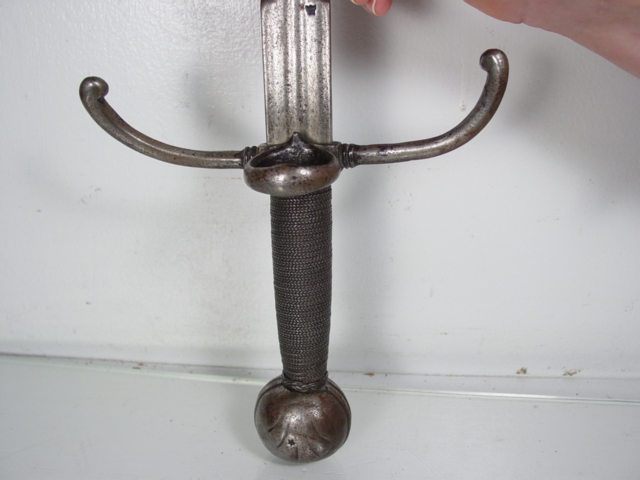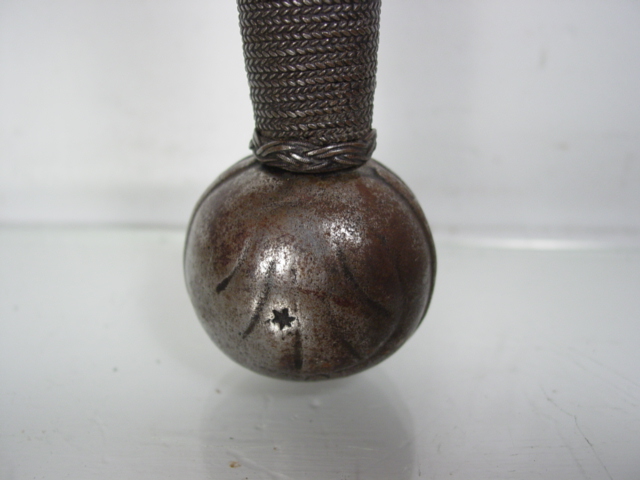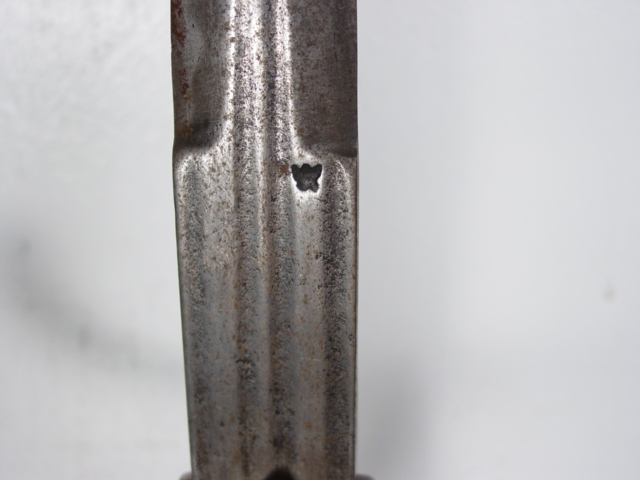Posts: 21
Sat 06 Sep, 2008 10:31 am
c1600 italian Steel Arming Sword??
Hey Folks-
I would covet the opinion of you guys as to the authenticity of this sword as c1600.
And the reasons it would be or wouldn't be a reproduction.
Thank you so much in advance,
Brad
Nashville
 Attachment: 127.69 KB
Attachment: 127.69 KB

 Attachment: 36.29 KB
Attachment: 36.29 KB

 Attachment: 119.3 KB
Attachment: 119.3 KB

 Attachment: 120.12 KB
Attachment: 120.12 KB

Posts: 26 Location: Oslo, Norway
Sat 06 Sep, 2008 10:43 am
Hey there.
Where did you get it from, have often has it been polished? The best way to determine the age would be from the corrosion. I'm by no means a scholar, just a blundering novice :)
How bout bringing the sword to a local museum, there should be someone there with the skill to answer your question.
-TK
Posts: 11,553 Location: San Francisco
Sat 06 Sep, 2008 11:13 am
Brad-
You can attach multiple photos to the same post. You do not need to make a separate post for each attachment. I've combined them into your original post.
Tomas-
Brad did not say he owns this sword. He may be hoping to purchase it and looking for input before he does.
Posts: 255 Location: ohio
Sat 06 Sep, 2008 2:15 pm
The blade, guard, and pommel look to be authentic. The grip appears to be a more modern addition. The big question is if all the pieces belong together? I think the sword is probably a composite piece, where the blade, guard and pommel were married into one complete sword. Of course that is just a guess from a photo that does not show the pommel where the blade was peened into place, that can be some strong evidence showing if a weapons has been apart. On a positive note, all three elements show similar patina and wear. The guard type usually has a broader style blade, instead of the thinner, almost rapier blade this one has. Also, the pommel will usually have a button on top, where the tang is peened. Of course these are not strict rules. I could find examples to break each stereotype. I know the answer is a bit ambiguous, but I hope it helps a bit.
Posts: 21
Sat 06 Sep, 2008 2:23 pm
...
Don,
Thanks for your analysis. I was wondering about the maker's mark/armory mark on the blade...also, that star on the pommel?? Are these marks native to Spain? or germany? Anyway, the main thing I was wondering was the possibility of it being an early repro.
I collect high end confederate swords and I'm just beginning my collection of european swords....with a little trepidation....
thanks for any help,
Brad
Posts: 1,191 Location: Kingston, Washington
Sat 06 Sep, 2008 9:45 pm
Brad;
IF it is a repro, it's an old one I would suspect. Might possibly be a German one from the Victorian age, as they were a popular item at the time. Then again, it could be original. I've noticed that the Victorian blades are often pretty poorly tempered, so if it bends like iron rather than spring steel, then it's Victorian. ;)
If it's original, I would bet that it's somewhat earlier than 1600, perhaps 50 or more years. That style was popular for Men at Arms throughout the 16th Century, but as the century progressed there was more of a move among armoured men to carry their complex hilted swords into battle rather than the plain arming swords of earlier decades, such as this one is.
Nifty sword I must say. Hopefully it does prove to be original. Good luck in finding out!
Cheers!
Gordon
Posts: 255 Location: ohio
Sun 07 Sep, 2008 7:09 am
I looked for the armourer's mark and couldn't find an exact match. It looks similar to some of the unidentified Italian marks I've seen but I don't think its attributed to any specific armourer. If I had to take a guess, I would say its either Italian or German. I say Italian because of its similarity to the 17th century Crab Claw hilted swords. However, Germany produced many of those distinctive arming swords with the downturned quillons and side ring. I've got one from the Graz armoury that is pretty similar. As for the mark on the pommel, it looks like an armourer's mark to me. Its not common to find marks of pommels but its not unheard of either.
Its always tough when you're starting to collect something that you are unfamiliar with. I went through a similar transition when I started collecting antique firearms. Its nice to have a resource like myArmoury. don't hesitate to ask questions, there are plenty of knowledgable people here to help.
Posts: 1,563 Location: Upstate NY
Sun 07 Sep, 2008 8:37 am
Just a note worth mentioning, as Don siad it is possible it is a composition piece but this does not rule out it being period, the practice or rehilting blades to up date them was fairly common at least from the middle ages on, there are several examples in ROTMS and i've held and examined personally a few examples that Dr. Lee Jones has in his own collection.
Posts: 60
Tue 09 Sep, 2008 8:20 am
Some more information that would be useful is total weight and a picture of the end of the pommel.
Posts: 5,981 Location: Birmingham, Alabama
Tue 09 Sep, 2008 1:53 pm
Could still be worth more than USD 1,000 even if a composite or 19th c. piece. What appears to be some recent, red rust raises some questions for me. FWIW, I think this is a very harmonious construction, no matter its provenance. It's always a red flag when the proportions of a piece don't look right. This looks like a nice, plain infantry sword to me--not necessarily something that would net sacks of cash for a modern forger, especially when you consider that an identical custom piece would probably be headed toward $1,000. But then, as a collector of premium CSA swords I'm sure you know how clever forgers can be.
Posts: 5,981 Location: Birmingham, Alabama
Tue 09 Sep, 2008 2:14 pm
See this 19th c. example at Czerny's for comparison:
http://www.czernys.com/auctions_lot.php?oggetto=32431&asta=23
Note the estimated auction price of 1200-1500 Euro.
Posts: 21
Tue 09 Sep, 2008 2:31 pm
$$
Sean-
It sold for $3738.00 USD.....
I was willing to pay $3100....It's probably worth twice that if all original and not a composite....But at some point you have to jump off the train:)
Anybody know where I can find a mid 16th century broad for $5000 or less?
Thanks to you guys,
BC
Posts: 87 Location: NY
Tue 09 Sep, 2008 2:58 pm
Hey guys, I was the winning bidder. I actually went to the antique shop where it was being sold from last week and got to handle it. It is very light and responsive, and the blade is stiff and springy. I didn't get to weigh it, but it must have been under two lbs. I have held many originals and this felt and looked good to me, in my amateur opinion.
The owner of the shop guarantees it, and says it is 100% authentic and not a composite.
I am a bit worried about the guard, as it looks like a dagger guard. I have never seen an example of a guard on a sword with such a small ring like that.
Posts: 21
Tue 09 Sep, 2008 3:03 pm
congrats Carl
I may have been willing to bid higher had I gotten to hold it as you did...
Bc
Posts: 87 Location: NY
Tue 09 Sep, 2008 4:00 pm
Hey Brad,
Yeah, I was worried about it being Victorian as well, but I drove an hour and a half just to check the blade out and loved it. I bankrupted myself purchasing it, but I figure that there are worse vices than collecting antique swords.
I'll tell you what, if I ever decide to sell it in the future, which I may, I will contact you first to see if you are interested.
I still can't find any examples of swords of that type with such a small side ring, which is troubling...
Posts: 21
Tue 09 Sep, 2008 4:17 pm
Carl-
I didn't think about it being a dagger hilt..that may be a possiblity....but I bet it's comtemporary with the rest...
What's your closest Museum?
bc
Posts: 87 Location: NY
Tue 09 Sep, 2008 7:31 pm
I am very close to the Metropolitan Museum of Art.
Are museums usually willing to examine pieces?
-Carl
| Brad Crisler wrote: |
Carl-
I didn't think about it being a dagger hilt..that may be a possiblity....but I bet it's comtemporary with the rest...
What's your closest Museum?
bc |
Posts: 255 Location: ohio
Tue 09 Sep, 2008 8:59 pm
I have a sword with a similar guard. I think you're ok on this one, it looks right to me. I'll look through my books to see if I can find a similar sword.
Posts: 87 Location: NY
Tue 09 Sep, 2008 9:49 pm
Thanks, Don! I now own two fine swords, hopefully. One of them being the one you sold me.
Would you be willing to perhaps post a picture of thesword you have that has a similar guard? On every similar sword I have seen in my books with a side ring, it is always much larger.
Someone on another forum commented that the armorer's mark on the blade is known as a "marca a mosca" (fly mark).
They also wrote that
"
Poldi pezzoli museum in Italy has at least two weapons with that mark. A Venetian two-hander from beginning XVI and spada di lato from North Italy end of XVIth century. Museo di arte Aplicate di Milano has also several from North Italy and end XVIth. One of them (cat 361) "Spada alla valenziana" from 1530-1550 from Venice too. Remarkably the mark is also off-centered, and blade of similar structure, but the grip is different."
They also commented that the mark on the pommel could be a Venetian arsenal mark. By the way, there is a crescent moon on the other side of the pommel. Here:
[ Linked Image ]
Posts: 9,557 Location: Dayton, OH
Wed 10 Sep, 2008 7:08 am
| Carl Massaro wrote: |
Would you be willing to perhaps post a picture of thesword you have that has a similar guard? On every similar sword I have seen in my books with a side ring, it is always much larger.
|
I'm not Don, but here is a picture of the hilt of his sword. :)
[ Linked Image ]
You
cannot post new topics in this forum
You
cannot reply to topics in this forum
You
cannot edit your posts in this forum
You
cannot delete your posts in this forum
You
cannot vote in polls in this forum
You
cannot attach files in this forum
You
can download files in this forum







